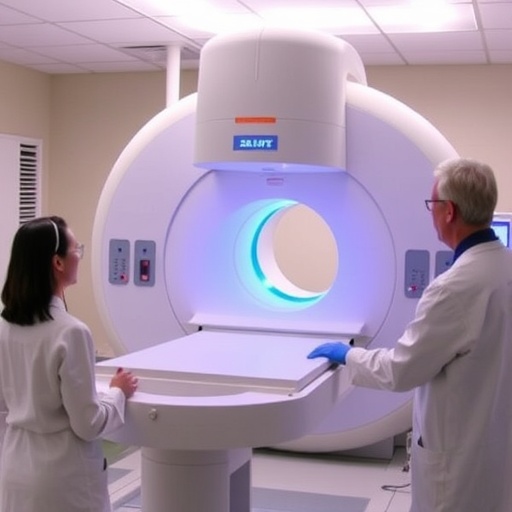The Society of Nuclear Medicine and Molecular Imaging (SNMMI) has issued a comprehensive position paper that addresses the critical education, training, and clinical experience requirements necessary for the safe and effective deployment of radiopharmaceutical therapy (RPT). This cutting-edge modality is revolutionizing cancer treatment by utilizing targeted radioactive agents that hone in on malignant cells with unparalleled precision. Published in October within the prestigious Journal of Nuclear Medicine, this document reinforces SNMMI’s commitment to guiding the responsible growth and global standardization of RPT, a cornerstone of modern precision oncology.
Radiopharmaceutical therapy hinges on the application of radioactive compounds designed to selectively localize within tumors, thereby delivering cytotoxic radiation precisely where it is needed while sparing surrounding healthy tissue. The explosive expansion of this field is propelled by substantial pharmaceutical investments in novel theranostic agents and synergistic treatment combinations. Examples include Pluvicto and Lutathera from Novartis, alongside Bayer’s Xofigo and Lantheus’ Azedra. As demand for these therapies surges, the oncology community anticipates performing hundreds of thousands of treatment cycles annually and establishing numerous additional specialized centers worldwide.
Despite its rapid ascent into mainstream oncologic practice, radiopharmaceutical therapy is not without precedent; it traces its roots back nearly a century within nuclear medicine. However, the unprecedented acceleration in its adoption has attracted interest from clinicians without specialized nuclear medicine expertise. The SNMMI position paper underscores that administration of these potent treatments mandates a refined skill set encompassing radiation safety, sophisticated dosimetry, and comprehensive patient management — competencies derived from dedicated training and extensive clinical experience. Inappropriate credentialing or inadequate education could jeopardize patient safety and diminish therapeutic efficacy.
The authors emphasize the transformative potential of RPT in cancer care, highlighting it as one of the most dynamic and promising therapeutic frontiers. They stress that as the field matures and expands, stewardship must remain with personnel who hold the requisite expertise, to uphold standards of safety, effectiveness, and quality critical to patient outcomes. This insistence on professional qualifications ensures that emerging therapies reach their full clinical potential and maintain consistent care standards globally.
To address these burgeoning needs, SNMMI has proactively developed specialized educational programs, designated centers of excellence, and constructed accreditation frameworks to certify facilities and practitioners capable of delivering RPT. The society additionally provides constantly updated treatment protocols and clinical trial guidance, reflecting the evolving scientific landscape. Continuous professional development offerings keep multidisciplinary teams—including physicians, technologists, radiochemists, and medical physicists—abreast of the latest technological advances, operational best practices, and regulatory mandates.
Central to the position paper is its robust focus on strict adherence to safety protocols. Safe handling and administration of radiopharmaceuticals are non-negotiable, given their radioactive nature. Accurate dosimetry, which quantifies the radiation dose delivered to target tissues and minimizes exposure to healthy organs, is fundamental to maximizing therapeutic benefit and minimizing adverse effects. Comprehensive radiation safety measures for staff, patients, and the public underpin the ethical delivery of these therapies, safeguarding all stakeholders involved.
Furthermore, the paper highlights SNMMI’s role as a nexus of global collaboration, working alongside disease-specific professional societies and international medical bodies. This network harmonizes treatment guidelines, fosters innovation exchange, and promotes best practices, ensuring a coherent global standard of care in RPT. Such partnerships accelerate the dissemination of breakthrough techniques and facilitate rapid integration of emerging scientific insights into clinical practice.
Interdisciplinary and multidisciplinary collaboration emerges as a critical theme within the paper. Nuclear medicine specialists, medical oncologists, radiologists, pharmacists, and allied professionals must closely coordinate to optimize patient selection, customize dosing parameters, and monitor outcomes. This collective approach permits the nuanced implementation of theranostics, where diagnosis and therapy converge, enabling bespoke cancer management tailored to individual tumor biology and patient profiles.
The authors further project that nuclear medicine will serve as the driving force in accelerating the clinical adoption of theranostics worldwide. By championing innovation, nurturing expertise, and advancing translational research, nuclear medicine professionals can solidify their leadership in the field. The paper portrays a future where the integration of molecular imaging and targeted radiopharmaceuticals will redefine standards of care, delivering transformative benefits to patients with hard-to-treat malignancies.
Moreover, the SNMMI’s initiatives to build an educational infrastructure and establish treatment centers prepare the next generation of clinicians to face the complex challenges associated with radiopharmaceutical therapies. Overcoming logistical, regulatory, and clinical hurdles requires a well-trained workforce fluent in the nuances of this evolving specialty. The society’s vision ensures that expertise keeps pace with the rapid influx of new agents and therapeutic protocols.
In essence, this position paper is a call to action. It implores healthcare systems, academic institutions, and regulatory agencies to recognize and uphold rigorous training and credentialing standards for anyone involved in radiopharmaceutical therapy. Doing so will safeguard patients, enhance treatment outcomes, and sustain the credibility and efficacy of this transformative therapy domain. The global nuclear medicine community, led by organizations like SNMMI, is uniquely positioned to steer this evolution responsibly.
In sum, as radiopharmaceutical therapy emerges from its historic niche into broad clinical practice, SNMMI’s leadership and comprehensive guidance set the foundation for its safe and effective implementation. The society’s commitment to education, protocol development, collaborative innovation, and international standardization is pivotal in harnessing the full potential of RPT to improve cancer patient survival and quality of life globally.
Subject of Research: Radiopharmaceutical Therapy and Its Education, Training, and Clinical Implementation
Article Title: “Radiopharmaceutical Therapy: Rapid Growth, Rising Challenges, and the Critical Need for Expertise”
News Publication Date: November 11, 2025
Web References:
Keywords: Personalized medicine, Molecular imaging




